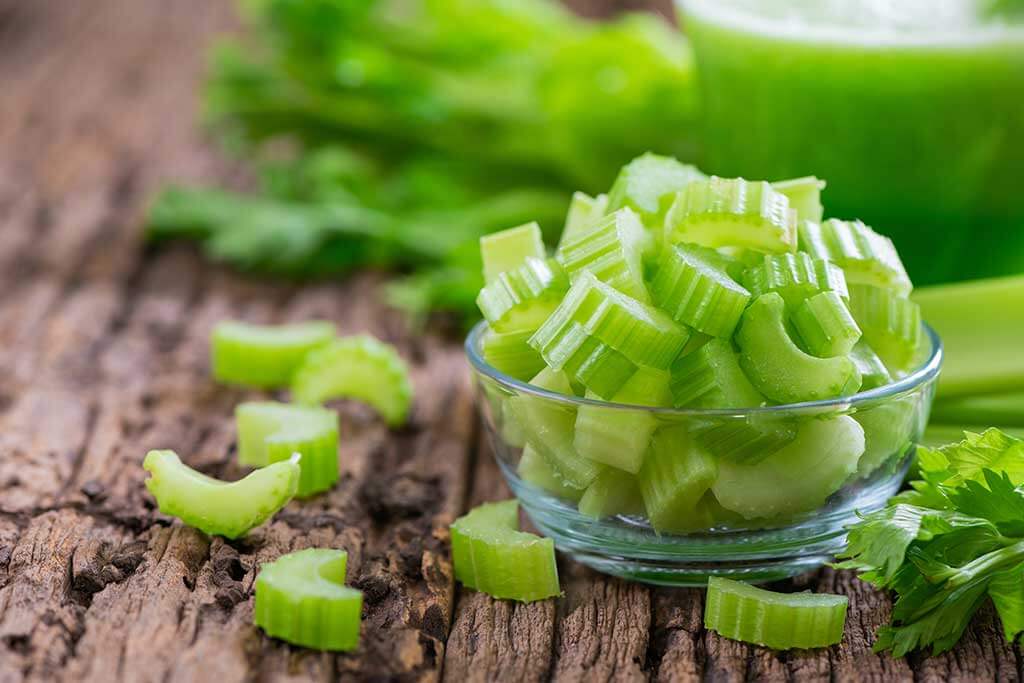Celery has medicinal uses dating as far back as the 9th century. Often used to treat gastrointestinal issues, heart and liver problems, this vegetable was not even regarded as a food in Europe until the 1700s. Even in the modern day, this vegetable has many health benefits. It’s also easy to prepare, so many older folks can incorporate it into dishes like soups and stews, or enjoy it as a snack topped with peanut butter or cheese. What exactly are these health benefits of celery?
Wide Range of Nutrients
Although there’s an old wives’ tale that celery provides “negative calories” as the body consumes more calories digesting it than it contains, that’s inaccurate. Each stalk of celery contains 20 calories, and an abundance of vitamins and minerals – these include vitamins A, B1, B2, B6, folic acid, vitamins C, E, D, K, calcium, magnesium, and potassium. Magnesium provides a soothing effect as it relaxes your central nervous system. The fiber content from celery can even help you feel fuller, reducing hunger pangs.
Protects Against Cancer
These leafy green stalks actually contain a number of compounds that prevent malignant cells from developing. Coumarin, a phytochemical, gives white blood cells a boost, and also helps to reduce migraines, and improves blood vessels. Apigenin and luteolin are two flavonoids found in celery that prevent cancer. All of these compounds also help to protect the lungs and pancreas from malignant cells.
Good for Vascular Health
Celery also contains a compound known as 3-n-butylphthalide (3nB), which reduces blood pressure, by up to 14%. This also helps to reduce cholesterol by up to 7%. Get your older loved ones to eat 4 to 6 stalks of celery daily for these benefits.
Some older folks may need more support and encouragement from caregivers, family, and friends to start and maintain a healthy diet and active lifestyle. Help them manage their diet and lifestyle as much as possible, to improve their health.
Mitigates Inflammation
Celery also comes with 3nB and polyacetylene compounds, which have anti-inflammatory and analgesic properties. This is useful for older folks with arthritis, fibromyalgia, or gout, to help relieve pain. Essentially, the anti-inflammatory properties of celery can reduce symptoms of asthma, respiratory infections, and stiff joints – issues that many of our older loved ones will face.
A study done by scientists from the University of Queensland in Australia demonstrated that giving older participants with gout, osteoarthritis, and osteoporosis 34mg of celery seed extract – twice a day for 12 weeks caused a 68% to 100% reduction in pain.
For caregivers and family members who want to help their older loved ones to eat healthier can consider incorporating foods like celery into their diets.
Great Source of Important Antioxidants
Cells, blood vessels, and organs are protected from oxidative damage by antioxidants. A celery stalk is packed with at least 12 different kinds of antioxidants in addition to vitamin C, beta carotene, and flavonoids.
Supports Digestion
Pectin-based polysaccharides found in celery, including one known as apiuman, have been shown in animal studies to prevent stomach ulcers, improve stomach linings, and modulate stomach secretions. Celery is also high in water content, plus it contains substantial amounts of soluble and insoluble fibers. All of these contribute to healthy digestion and keep you regular.







